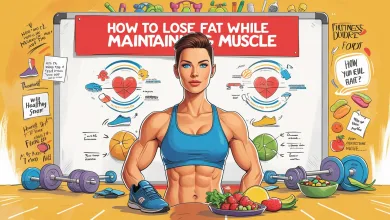Protein Deficiency Signs: Are You Getting Enough?

Feeling constantly drained, struggling with slow-healing wounds, or noticing your hair thinning? These could be your body’s way of waving red flags about protein deficiency. In this comprehensive guide, we’ll explore the telltale signs of inadequate protein intake and what you can do to restore your nutritional balance.
What’s the Big Deal About Protein, Anyway?
Protein isn’t just another nutrition buzzword that health gurus throw around. It’s literally the building block of life! Every single cell in your body contains protein, from your skin and muscles to your enzymes and hormones. You’ve probably heard fitness enthusiasts ramble on about protein shakes and chicken breasts, but the importance of this macronutrient goes way beyond bulking up at the gym.
When you’re not getting enough protein, your body doesn’t just shrug and move on. Oh no, it starts sending out distress signals – sometimes subtle, sometimes blaring like a car alarm at 3 AM. The tricky part? Many people don’t recognize these signals for what they are. According to the World Health Organization, an estimated 462 million adults worldwide are undernourished, with protein deficiency being a significant concern. That’s a staggering number, and you definitely don’t want to be part of that statistic!
The Silent Crisis: Understanding Protein Deficiency
Protein deficiency, also known as hypoproteinemia when it becomes severe, isn’t just something that happens in developing countries. It’s lurking in affluent societies too, hiding behind busy lifestyles, restrictive diets, and misconceptions about nutrition. The American Journal of Clinical Nutrition reports that while severe protein deficiency is rare in developed countries, marginal deficiency is surprisingly common, especially among older adults, chronic dieters, and those with certain medical conditions.
But here’s the kicker – you don’t need to be severely deficient to experience negative effects. Even a modest shortfall in protein intake can impact your health in ways you might not connect to your diet. Your body is incredibly complex, and protein plays a role in practically every function. When supplies run low, your system has to make tough decisions about where to allocate its limited resources. Some processes get shortchanged, and that’s when the symptoms start to appear.
12 Warning Signs Your Body Needs More Protein
Your body has its own language for communicating with you, and when protein levels drop, it starts talking loudly. Here are the key signs you should never ignore:
1. Persistent Fatigue and Weakness
Do you feel like you’re constantly running on empty, even after a full night’s sleep? Protein is essential for maintaining energy levels. Without enough, your body struggles to repair tissues and produce the enzymes and hormones that regulate energy. A study published in the Journal of American College of Nutrition found that individuals with inadequate protein intake reported significantly higher levels of fatigue compared to those consuming sufficient amounts.
This isn’t your standard afternoon slump – we’re talking about a bone-deep weariness that doesn’t go away with rest. Your muscles might feel weak, everyday tasks become exhausting, and you might find yourself wondering why everyone else seems to have so much more energy than you do.
2. Hair, Skin, and Nail Problems
Notice your hair falling out more than usual? Nails breaking? Skin looking dull? Your body considers these structures “non-essential” compared to vital organs, so when protein is limited, these areas are the first to show signs of neglect.
Protein is crucial for producing keratin, collagen, and elastin – the structural components that keep your hair shiny, your nails strong, and your skin elastic. According to dermatologists at the American Academy of Dermatology, protein deficiency can manifest as brittle nails with white bands, hair that falls out easily when brushed, and skin that becomes dry, flaky, or loses its natural glow.
3. Increased Risk of Infections and Slow Healing
Ever wonder why that papercut is taking forever to heal? Or why you seem to catch every cold that goes around the office? Protein plays a vital role in immune function and tissue repair. Without adequate amounts, your body can’t produce enough white blood cells to fight infections, and it struggles to rebuild damaged tissues.
Research published in the British Journal of Nutrition indicates that even moderate protein deficiency can impair immune responses and delay wound healing significantly. This becomes particularly important for older adults, whose protein needs increase as they age, while appetite often decreases.
4. Muscle Wasting and Loss of Strength
Your muscles aren’t just for showing off at the beach – they’re essential for everyday movement, maintaining posture, and even basic metabolism. When protein intake is insufficient, your body may start breaking down muscle tissue to access the amino acids it needs for more critical functions.
This process, called muscle wasting or sarcopenia when chronic, can happen surprisingly quickly. Studies from the Journal of Nutrition show that muscle loss can begin within just a few days of inadequate protein consumption. The scary part? Once lost, muscle mass is much harder to rebuild than it was to maintain in the first place, especially as you age.
5. Swelling (Edema) and Fluid Retention
Noticed your ankles, feet, or hands swelling up for no apparent reason? That puffy appearance might be edema, a common sign of protein deficiency. Proteins, particularly albumin, help maintain the right balance of fluids in your tissues. When protein levels drop, fluid can leak out of blood vessels and collect in tissues, causing that swollen appearance.
The National Kidney Foundation explains that this type of edema often appears first in areas where gravity can cause fluid to pool, like feet and ankles if you spend a lot of time standing, or around the eyes after lying down. While there are many causes of edema, protein deficiency should always be considered when it occurs without obvious explanation.
6. Brain Fog and Mood Changes
Can’t concentrate? Feeling unusually irritable or down? Your brain relies heavily on amino acids (the building blocks of protein) to produce neurotransmitters that regulate mood, cognition, and mental clarity. Without sufficient protein, your brain chemistry can get thrown off balance.
Researchers at the Massachusetts Institute of Technology have demonstrated links between protein intake, specifically certain amino acids, and the production of serotonin and dopamine – key neurotransmitters that influence everything from mood to focus. Protein deficiency can leave you feeling mentally foggy, emotionally unstable, and less able to handle stress.
7. Intense Cravings and Increased Hunger
Your body is smart. When it detects a nutritional deficiency, it often triggers cravings in an attempt to get what it needs. If you’re constantly hungry despite eating regular meals, or if you experience intense cravings (particularly for meat or other protein-rich foods), your body might be sending you a message.
What makes this particularly challenging is that protein is highly satiating – it keeps you feeling full longer than carbohydrates do. According to research published in the American Journal of Clinical Nutrition, adequate protein intake is strongly associated with reduced hunger and better appetite control. When you’re deficient, you might find yourself in a vicious cycle of constant hunger that leads to unhealthy snacking on readily available (often carb-heavy) foods.
8. Irregular Menstrual Cycles
Ladies, pay attention to this one! Protein plays a crucial role in hormone production and regulation. Insufficient protein can disrupt the delicate balance of reproductive hormones, potentially leading to irregular or missed periods.
The American College of Obstetricians and Gynecologists notes that nutritional deficiencies, including protein deficiency, are common but often overlooked causes of menstrual irregularities. If you’ve noticed changes in your cycle along with other symptoms mentioned here, your protein intake might be worth examining.
9. Bone and Joint Pain
Your bones are living tissues that constantly rebuild themselves, and guess what they need for this process? You got it – protein. While calcium gets most of the attention for bone health, protein is equally important for maintaining bone density and strength.
Research from the Journal of Bone and Mineral Research suggests that low protein intake is associated with decreased bone mineral density and increased risk of fractures. Additionally, protein is essential for maintaining the cartilage in your joints, so a deficiency might manifest as joint pain or increased vulnerability to injuries.
10. Changes in Sleep Patterns
Tossing and turning all night? Protein deficiency might be the culprit you haven’t considered. Proteins are involved in the production of melatonin and other sleep-regulating hormones. Without enough, your sleep-wake cycle can become disrupted.
Sleep scientists at the Sleep Foundation have found connections between dietary protein intake and sleep quality. People with inadequate protein often report difficulty falling asleep, staying asleep, or feeling rested upon waking – all of which can compound the fatigue already caused by the deficiency.
11. Blood Sugar Fluctuations
If you’re experiencing energy crashes, shakiness between meals, or unusual hunger even shortly after eating, your protein intake might be part of the problem. Protein helps slow the absorption of carbohydrates, which stabilizes blood sugar levels and prevents those dramatic spikes and crashes.
The American Diabetes Association recommends adequate protein intake as part of a balanced approach to blood sugar management. Without enough protein in your meals, you might find yourself on a blood sugar roller coaster that leaves you feeling constantly drained and craving quick energy from sugary foods.
12. Weight Gain Despite Not Eating More
This one seems counterintuitive, but protein deficiency can actually contribute to weight gain. Here’s how: when muscle mass decreases due to inadequate protein, your basal metabolic rate (the calories you burn at rest) drops. Meanwhile, the blood sugar fluctuations we just discussed can lead to increased fat storage and cravings for high-calorie foods.
Researchers at Harvard Medical School have found that higher protein diets are associated with better weight management and body composition, partly because protein supports lean muscle mass and increases thermogenesis (calorie burning) during digestion.
Who’s at Risk for Protein Deficiency?
While anyone can develop protein deficiency, certain groups face higher risks:
- Strict vegetarians and vegans who don’t carefully plan their diets
- Older adults, who often eat less while actually needing more protein
- People with chronic digestive conditions like Crohn’s disease or celiac disease
- Individuals recovering from surgery or severe injuries
- Those with eating disorders or very restrictive diets
- Pregnant or breastfeeding women with increased protein requirements
- People with certain chronic illnesses like cancer or kidney disease
- Endurance athletes who don’t adjust their intake to match their training
If you fall into any of these categories, paying extra attention to your protein intake is especially important.
How Much Protein Do You Actually Need?
This question doesn’t have a one-size-fits-all answer, and that’s part of the problem. The traditional recommendation from the Food and Nutrition Board is 0.8 grams of protein per kilogram of body weight daily for adults. However, many nutrition experts now believe this is merely the minimum to prevent deficiency, not the optimal amount for health.
Factors that influence your personal protein needs include:
- Age (needs increase as you get older)
- Activity level (athletes need significantly more)
- Pregnancy and breastfeeding status
- Health conditions and recovery
- Body composition goals
As a general guideline, many nutritionists now recommend:
- Sedentary adults: 1.0-1.2 g/kg body weight
- Moderately active adults: 1.2-1.7 g/kg body weight
- Very active adults or those building muscle: 1.6-2.2 g/kg body weight
- Adults over 65: At least 1.2-1.5 g/kg body weight
For a 150-pound (68 kg) person, this translates to approximately 68-82 grams at the lower end and up to 150 grams at the higher end of these ranges.
Top Protein Sources for Every Diet
Whether you’re an omnivore, vegetarian, or vegan, plenty of protein options exist:
Animal-Based Proteins (Complete Proteins)
- Eggs (6g per large egg)
- Chicken breast (31g per 100g)
- Greek yogurt (10g per 100g)
- Salmon (25g per 100g)
- Lean beef (26g per 100g)
Plant-Based Proteins
- Lentils (9g per 100g cooked)
- Chickpeas (8.9g per 100g cooked)
- Tofu (8g per 100g)
- Quinoa (4.4g per 100g cooked)
- Hemp seeds (31g per 100g)
- Seitan (25g per 100g)
Protein Supplements
- Whey protein (typical range: 20-25g per scoop)
- Pea protein (typical range: 15-24g per scoop)
- Hemp protein (typical range: 12-20g per scoop)
- Brown rice protein (typical range: 15-22g per scoop)
The key is distributing your protein intake throughout the day rather than consuming it all at once, which maximizes your body’s ability to use it efficiently.
Addressing Protein Deficiency: Your Action Plan
If you suspect you’re not getting enough protein, here’s a step-by-step approach to address the issue:
- Consult with a healthcare provider to rule out any underlying medical conditions. Blood tests can confirm hypoproteinemia if it’s present.
- Track your current protein intake for a week using a nutrition app or food diary to establish your baseline.
- Gradually increase protein consumption rather than making dramatic overnight changes, which can stress your digestive system.
- Distribute protein intake evenly throughout the day, aiming for some protein with each meal and snack.
- Consider digestibility – some proteins are more easily absorbed than others. Animal proteins typically have higher bioavailability than plant proteins.
- Address any barriers to protein consumption, such as dental problems, food preparation challenges, or financial constraints.
- Reevaluate after 2-3 months – most symptoms of mild to moderate protein deficiency should improve within this timeframe if you’re consistently meeting your needs.
Frequently Asked Questions About Protein Deficiency
Can you have protein deficiency even if you eat meat?
Absolutely! While meat eaters are generally at lower risk, protein deficiency can still occur if overall protein intake is inadequate, if you have increased needs due to illness or exercise, or if you have absorption issues. Quality matters as much as quantity.
How quickly can protein deficiency develop?
Mild symptoms can appear within weeks of inadequate intake, while more severe manifestations may take months to develop. The body has some protein reserves it can draw upon, but these are limited.
Can protein supplements replace food sources?
While supplements can be helpful for meeting increased needs or addressing gaps in the diet, whole food sources are generally preferable as they provide additional nutrients that work synergistically with protein. The Academy of Nutrition and Dietetics recommends getting most of your protein from food sources when possible.
Is animal protein better than plant protein?
Animal proteins are considered “complete” because they contain all essential amino acids in adequate proportions. However, a well-planned plant-based diet can absolutely meet protein needs through complementary protein sources or careful selection of plant foods higher in limiting amino acids.
Can too much protein be harmful?
For most healthy individuals, moderately high protein intake is safe. However, those with kidney disease may need to restrict protein. Very high intake (above 2.5g/kg body weight daily for extended periods) hasn’t shown clear benefits and may increase risk of dehydration and calcium excretion.
The Bottom Line: Protein Matters More Than You Think
Protein deficiency isn’t just a concern for those in developing countries or extreme athletes – it’s something anyone can experience, often without realizing the true cause of their symptoms. The signs we’ve discussed are your body’s way of alerting you to a problem that needs addressing.
The good news? Protein deficiency is generally straightforward to correct once identified. By tuning into your body’s signals, understanding your individual protein needs, and making conscious dietary choices, you can ensure you’re giving your body the building blocks it needs to function at its best.
Remember, nutrition isn’t about perfection – it’s about consistency and awareness. Small, sustainable changes to increase your protein intake can yield significant improvements in how you look, feel, and function. Your body has been talking to you all along – now you know how to listen!





